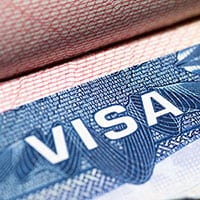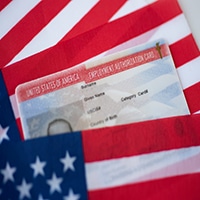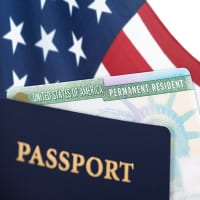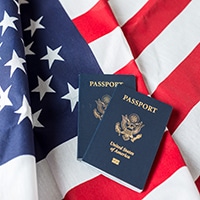Getting Married and Moving to the United States
If you are engaged to and are planning to marry a U.S. citizen, you have a number of options regarding your immigration to the United States. You must first acquire the appropriate immigration authorization to move and work in the United States by one of the following paths…
Learn More About Each of These Steps Below…
Visas for Fiancés of U.S. Citizens
If you are a U.S. citizen who wants to bring your foreign fiancé to the United States in order to get married, you will need to file a petition. This is the first step to obtaining a K-1 non-immigrant visa for your fiancé. The K-1 non-immigrant visa is also known as a fiancé visa.
In order to obtain a K-1 fiancé visa, you and your fiancé must intend to marry each other within 90 days of your fiancé entering the U.S as a K-1 non-immigrant. Your marriage must be valid, meaning both you and your fiancé have a bona fide intent to establish a life together and the marriage is not for the sole purpose of obtaining an immigration benefit.
If your fiancé marries you within 90 days of being admitted to the United States as a K-1 non-immigrant, he or she may apply for lawful permanent resident status in the United States (a Green Card).
Temporary Work Authorization
After being admitted to the U.S. on a K-1 non-immigrant visa, your fiancé may immediately apply for work authorization. In this case, your fiancé’s work authorization is valid for only 90 days after his or her entry into the U.S.
Your fiancé may also apply for work authorization at the same time he or she applies for a Green Card. In this case, your fiancé’s work authorization is valid for one year and may be extended in one-year increments.
Once your green card is approved, you no longer need a work authorization card as the green card provides permanent residency and full employment authorization.
Marriage Green Card
A Canadian citizen who has married a U.S. citizen is generally entitled to apply for permanent residency. The U.S. citizen spouse will file a form known as “Petition for Alien Relative” with the USCIS, petitioning for the Canadian spouse to become a U.S. permanent resident. As part of the petition, the U.S. citizen will also have to sign an affidavit of support, declaring that he/she will be financially able to support the Canadian citizen and that he/she will not be a public charge. In other words, the U.S. citizen spouse is declaring that he/she can support his/her spouse so that the spouse does not become a burden to society by way of collecting unemployment insurance etc.
The Canadian citizen spouse may concurrently file a form known as an Application to Register Permanent Residence or Adjust Status, seeking to change the Canadian’s current immigration status to that of a permanent resident. Depending on the Canadian’s situation, he/she may also apply for a temporary work permit or a temporary travel permit. These are optional, and should only be sought if the Canadian citizen is not currently on a valid work visa or anticipates that the work visa will expire before the green card is approved. The Canadian citizen will also have to get fingerprinted and undergo a medical examination by a designated civil surgeon to ensure that he/she is healthy – again, so as not to become a public charge.
Acquiring U.S. Citizenship
You may qualify for U.S. citizenship if you have been a lawful permanent resident (Green Card holder) for at least 3 years and have been living in marital union with the same U.S. citizen spouse during such time. To be eligible for naturalization, an applicant must:
- Be 18 or older
- Be a permanent resident (Green Card holder) for at least 3 years immediately preceding the date of filing
- Have been living in marital union with the U.S. citizen spouse, who has been a U.S. citizen during all of such period, during the 3 years immediately preceding the date of filing the application and up until examination on the application
- Have lived within the state, or USCIS district with jurisdiction over the applicant’s place of residence, for at least 3 months prior to the date of filing the application
- Have continuous residence in the United States as a lawful permanent resident for at least 3 years immediately preceding the date of filing the application
- Reside continuously within the United States from the date of application for naturalization until the time of naturalization
- Be physically present in the United States for at least 18 months out of the 3 years immediately preceding the date of filing the application
- Be able to read, write, and speak English and have knowledge and an understanding of U.S. history and government (also known as civics)
- Be a person of good moral character, attached to the principles of the Constitution of the United States, and well disposed to the good order and happiness of the United States during all relevant periods under the law
Immigration Questions? We Are Here to Help!
Contact Our U.S. Immigration Experts For More Information About Canadians Marrying U.S. Citizens
Our immigration team will offer a FREE consultation to discuss your immigration needs.





